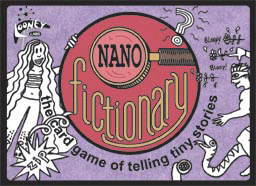
|
About OgreCave and its staff
|

|
by Cedric Chin
In the Ice Cream Parlor on the Moon, there was a terrible problem: the serving robot had malfunctioned! He was flinging ice cream everywhere! So they called for a repairman, and in came the Dude Who Always Says "Dude!" The Dude took one look and said, "Dude It's easy! All you need is Duct Tape!" No, you haven't stumbled upon a very odd roleplaying game, but you're enjoyably close. Like roleplaying games, storytelling games allow the players to use their creativity to form their own tales. Storytelling games typically feature story elements (so a player doesn't have to face a "blank piece of paper") and simple mechanics. Examples of storytelling games are Atlas Games' Once Upon a Time, Hogshead Publishing's Baron Munshausen, and Wingnut Games' Soap. The game consists of a deck of cards. The cards themselves have playful, childlike black-and-white art on each pastel-framed playing card.
Mechanics There are two card types: Plot Cards and Action Cards. The Plot Cards help create a story that takes place in the present. Some example Plot Cards are: Character:The Action Cards allow you to complete various special actions, such as take a played card from another player (Plagiarism), play an additional Plot Device card (Complication), receive Plot Device cards from other players (Brainstorm), and retrieve a Plot Device card from the discard (Uncrumple). After the stories are told, players -- and spectators -- vote for their favorite story, with the winner being whoever gets the most points from votes and other factors (see below). For those who enjoy more competition, there's the Anthology variant. Players rotate being the Judge. The Judge deals two Character cards, a Setting card, a Problem card, and a Resolution card. Each player makes up a story from the cards. The Judge awards a First and Second place. Each player has an opportunity to be a Judge. The player who scores the highest score (based on the First and Second place awards) wins.
Comments Nanofictionary's storytelling occurs at the end of the game, giving players time to look at their cards and think up a story. In contrast, other storytelling games we've played require the players improvise the story as they play. Our only nitpick is that we felt that the scoring phase was more complicated than it should be. In scoring, each player receives points for when they finished playing, points for what place they received from another player, points awarded by outside specators, etc. When awarding a place to another player, special cards to determine which story you felt was the best are played face down. We'd rather have a simpler method -- perhaps a majority vote or something.
Recommendations
|
||
 Nanofictionary
Nanofictionary